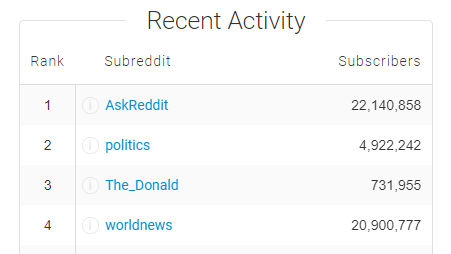
IPFS News Link • Investigations
Here Is The Striking Discovery From Bloomberg's Investigation Of YouTube
• https://www.zerohedge.comAccording to a lengthy investigation by Bloomberg on Google's struggle to maximize profit while addressing calls to censor 'toxic' material, a rogue employee decided to ignore the advice of corporate attorneys and created a new "vertical" category to internally track so-called "alt-right" content - described as "the political ensemble loosely tied to Trump."
What they found was fascinating; alt-right videos are an absolute monster category for the video-hosting platform, right up with "music, sports and gaming" as the most popular.
One telling moment happened around early 2018, according to two people familiar with it. An employee decided to create a new YouTube "vertical," a category that the company uses to group its mountain of video footage. This person gathered together videos under an imagined vertical for the "alt-right," the political ensemble loosely tied to Trump. Based on engagement, the hypothetical alt-right category sat with music, sports and gaming as the most popular channels at YouTube, an attempt to show how critical these videos were to YouTube's business. -Bloomberg
Three days after the 2016 US election, YouTube CEO Susan Wojcicki and her staff convened for their weekly meeting, where one employee "fretted aloud about the site's election-related videos that were watched the most," as they were "dominated by publishers like Breitbart News and Infowars, which were known for outrage and provocation."
Obviously providing a watering hole for conservatives - which Bloomberg and Google can't help but associate with 'toxic' content - is highly profitable. On social media platform Reddit, pro-Trump forum "The_Donald" is roughly the 264th largest "subreddit" by size, while ranked #3 in terms of user activity on the site, according to "redditlist."
YouTube, meanwhile, has been trying to figure out how to properly pay content "creators" who were growing frustrated over the pay structure. To meet the challenge, the company would pitch an overhaul of their entire business model which would revolve around "engagement" - how many people watched a video, and for how long. They called it "Project Bean."
Wojcicki and her lieutenants drew up a plan. YouTube called it Project Bean or, at times, "Boil The Ocean," to indicate the enormity of the task. (Sometimes they called it BTO3 – a third dramatic overhaul for YouTube, after initiatives to boost mobile viewing and subscriptions.) The plan was to rewrite YouTube's entire business model, according to three former senior staffers who worked on it.
It centered on a way to pay creators that isn't based on the ads their videos hosted. Instead, YouTube would pay on engagement—how many viewers watched a video and how long they watched. A special algorithm would pool incoming cash, then divvy it out to creators, even if no ads ran on their videos. The idea was to reward video stars shorted by the system, such as those making sex education and music videos, which marquee advertisers found too risqué to endorse. -Bloomberg
YouTube's ambitious overhaul had some unintended consequences; by rewarding videos that achieved popularity by outrage - someone like Alex Jones would become one of YouTube's highest paid stars.
Ultimately, Google CEO Sundar Pichai ditched project bean because "he felt it could make the filter bubble problem worse," according to Bloomberg.
































